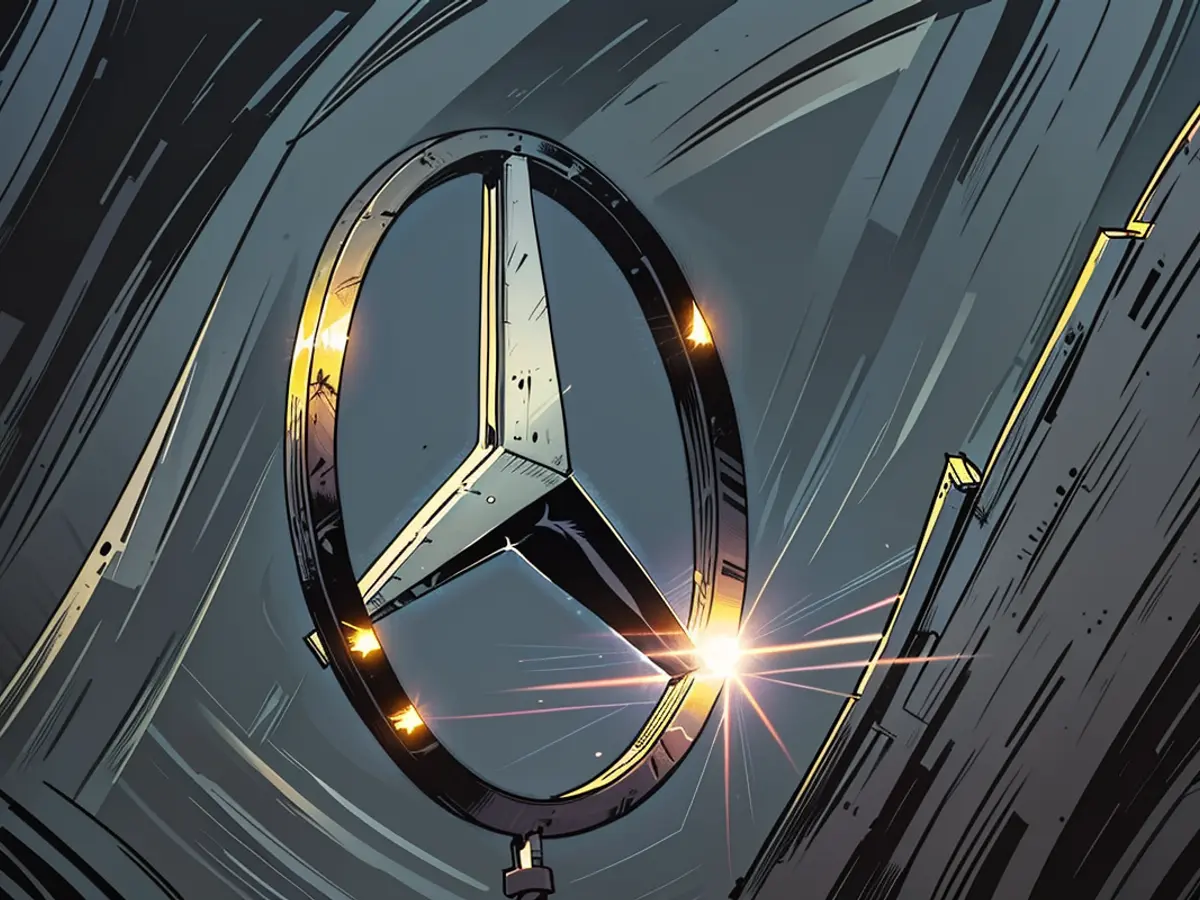Prepared for a spectacular failure, numerous individuals will inevitably end up suffering losses.
It's all gone to pot. BMW, Mercedes-Benz, and Volkswagen have squandered the opportunity in two significant global trends: battery productions and software development, leading to them losing their dominant position in the automotive sector. Achim Kampker, an automotive expert from RWTH Aachen, discussing on ntv's "Climate Lab", asserts that the industry can recover, but only with cooperation from all parties, including the general populace; "We can't discuss working four days while others are working six," Kampker says, warning of severe reductions. He explains, "This is more like a purifying winter than a refreshing storm, we should brace ourselves for a while."
ntv.de reports that Bavaria's Minister of Economic Affairs, Hubert Aiwanger, is currently on a tour in China along with an economic delegation, visiting Chinese automakers like Li Auto, BYD, and the Shenzhen Bus Group. Is Mr. Aiwanger checking out potential replacements for BMW, Mercedes, and Volkswagen?
Kampker responds, "I don't think so, but they are serious competitors with sustainable expertise. They've been churning out cars for years, done their homework, and they've caught up, especially on the Chinese market. They know what's cool. So let's put aside our arrogance and figure out how we can compete in this race."
The Bavarian Ministry of Economic Affairs states that the primary focus of the trip is the "Future of Mobility". Are foreign delegations finally recognizing this in China?
Kampker agrees, "China's market, due to its size, is now setting trends. This has shifted. In the past decades, many innovations came from German houses and they were later bought worldwide. Now we must accept that the leading trade fairs, the latest developments, are taking place in China. It's right to go there and see what is happening and learn from it."
Some economists forecast doom for German car manufacturers, with critic Frank Thelen declaring, "The end of the entire German automotive industry."
Kampker counters, "Such waves always occur. A few years ago, it was asked whether the Japanese would outshine us in automotive manufacturing, automation, and robotics. That didn't happen. But this time, the situation is indeed more serious because China is doing things right on many levels of the industry: in machine and plant engineering, in battery-driven technology, in the automotive and software sectors. However, the German car manufacturers still have potential, many smart people. The most important thing is to recognize the threat now and draw the right conclusions."
But German car manufacturers are struggling at the present moment.
Kampker describes, "Struggling" depends on perspective. We no longer hold the top spot. But the world is not black and white, it's gray. Many companies are fighting for survival in the supplier structure due to the switch from combustion engines to electric vehicles. Many jobs will probably be cut."
Two megatrends are causing the situation to be so critical and dangerous: IT and batteries. Battery production comprises a significant portion of the value creation and isn't based here anymore – from the facilities that build the batteries. In the software sector, we haven't kept up either. It's like Nokia, they focused on making calls for a long time and kept improving it. This worked, but suddenly, things required with the smartphone, in which Nokia had no core competency. We see something similar now. In classic car manufacturing, bodies and parts, we're still top. But in China, Daimler or BMW are no longer considered hip or modern, but old-fashioned. It wasn't anticipated and a result of a certain arrogance.
Was there a pivotal moment for this?
No. Electric vehicles were underestimated for too long, and it wasn't understood that they would be market-determining. One wanted to wait for or sit out this trend. This is also due to the fact that one was so successful in the combustion engine sector. This happens again and again. Countries or companies have special core competencies and are particularly successful with them. But when a change occurs, the successful ones have a particularly hard time.
You're talking about the Innovator's Dilemma?
Yes. One underestimated the battery market and the software platform and that's why we're where we are. But I have the impression that these topics have now been recognized. VW has recently bet heavily on electromobility, but had to do a lot at once and is facing numerous problems due to the high complexity. The strategy is still correct, but it's no longer possible without major cuts. Keeping jobs and high wages isn't feasible anymore. It's going to be tough.
A cleansing storm?
Yes.
This situation involves a significant shift in the German automobile industry, which will undoubtedly have numerous losers. However, I don't anticipate an overall decline if we collectively understand the situation: it's five past twelve. Everyone has a role to play, including the general public. We can't discuss a four-day workweek while others are still working six days a week. This is a worldwide competition, and others are no longer just imitating us but leading in several aspects. Everybody needs to comprehend this if we're to emerge from this predicament. This challenge won't be resolved within twelve months; instead, it's likely to persist for years - more like a purifying winter than a brief storm that vanishes after an hour, leaving the sun to shine again. We must steel ourselves for this.
People seem to harbor skepticism about electric cars, particularly in Germany. They remain fiercely devoted to their combustion engines and even celebrate poor electric car sales figures. However, there's a 20% global expansion in the electric mobility sector. Denying its existence or predicting its rapid disappearance is irrational. Expecting a 100% transition to electric vehicles within five or six years is unrealistic as well. The truth lies somewhere in between. Traditional engines will continue to be in use for several more years; the question is merely the proportion they will hold. But let's cease disparaging the other technology. It's a waste of time. Everyone should attend to their own issues and advance them. Eventually, the global market will determine the outcome. There will be a considerable electric share there. Preparing for that is crucial if we aspire to lead.
Does Volkswagen need to create another iconic vehicle like the Beetle to drive this change? So far, German car manufacturers have primarily offered luxury models that many can't afford. Particularly in the compact car segment, the Chinese are poised to seize a significant market share. German automakers offer little in terms of combustion engines in this segment. In higher-priced classes, I see potential for maintaining large market shares if we up our game, but we can't ignore the fact that China is producing high-quality vehicles. The premium segment in Europe will also be fiercely contested, despite its regulated and complex nature.
Would tariffs be beneficial? The EU is considering this, but the German Chancellor has expressly opposed it. He favors winning the competition with the best cars and most advanced technologies, but that's precisely what we lack.
Tariffs are not a promising solution. They may alleviate problems temporarily, but they'll also provoke a retaliation. As I mentioned, we lack significant offerings in the compact car segment. Tariffs could hinder the progress of electric mobility. It's inconsistent to advocate for free trade when we're ahead and then build trade barriers as soon as we fall behind. That's not how a market economy functions. A trade war has never led to improvement.
Christian Herrmann spoke with Achim Kampker. The conversation was edited for clarity and coherence. You can listen to the full conversation on the podcast "Klima-Labor".
The manufacturing of motor vehicles is a significant area where Chinese automakers like Li Auto, BYD, and the Shenzhen Bus Group are making strides. These companies are considered serious competitors by Achim Kampker, an automotive expert, due to their expertise in sustainable technology and market knowledge, particularly in China.
Achim Kampker also acknowledges that China's market is now setting trends in the automotive industry, and it's crucial for foreign delegations like Bavaria's Ministry of Economic Affairs to visit and learn from it. This shift in trend is causing concerns for some economists who fear doom for German car manufacturers. However, Kampker believes that German manufacturers still have potential and smart people, and the most important thing is to recognize the threat and draw the right conclusions.









